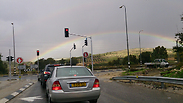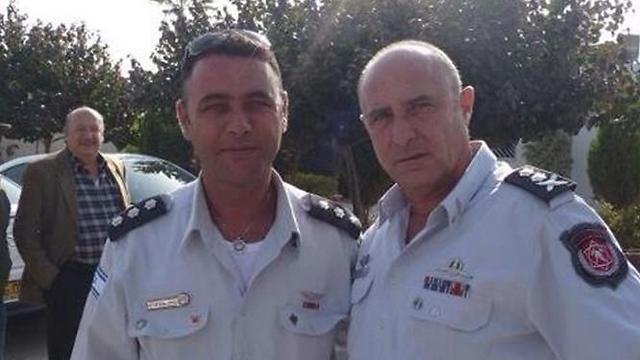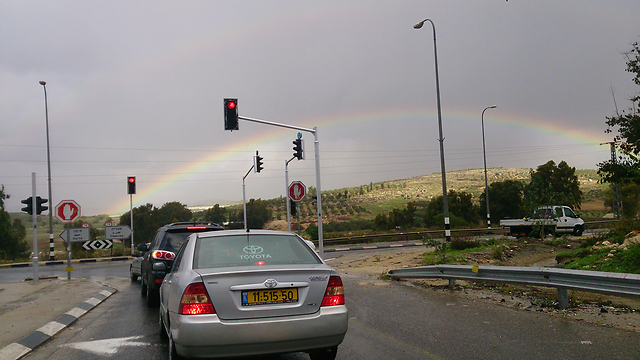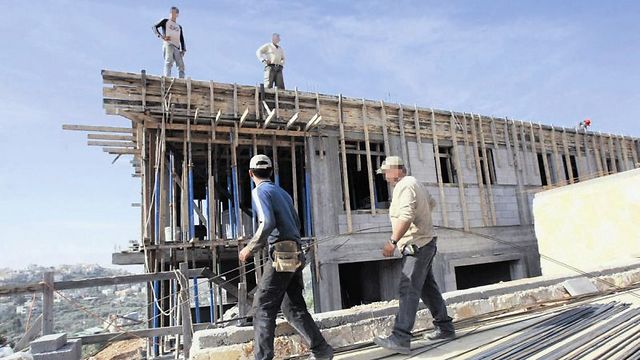
Arab workers feeling the fear
Ashraf Katayef's restaurant is struggling while contractors report Arab workers are scarce these days; 'The situation is frightening.'
Ubaid travels to Tel Aviv from his home in Haifa every day for work. He says that at work things have stayed the same. “I have very close friends, like family,” he says, “I see them even more than my parents, live every minute with them for hours.”
Out in public, however, things are different. “I haven’t run into extreme reactions personally, but in general, the situation is frightening. This is the first time I’ve felt real fear of potential reprisal from people in the street. I’ve never experienced that.”
Restaurants in Nazareth: Business is down
If business in general seems to be suffering the consequences of the public’s fear, the Arab sector’s businesses are experiencing a virtual crash, with some registering a 80-90 percent decline in clientele and income. This is especially true in towns with mixed Arab-Jewish populations.
Ashraf Katayef, 63 from Nazareth, says of his restaurant in the city’s market, “There are no customers at all, the market is empty, no Arabs or Jews.” And it’s not just about sales – Katayef says some of his friends, who work outside Nazareth, are now afraid to go to work. “People don’t go out to work and shut themselves in at home, because they’re afraid. Everyone has children who are working or studying outside the city, and they worry about them. It’s not comfortable for anyone, both sides feel fear.
Katayef, a father and grandfather, opened his restaurant 16 years ago. “I’m disappointed, because we want to promote peace,” he says, “but now we’re going backwards. Before, customers came from the center (of Israel) and it was fun working with everyone. It’s a special place of fraternity and coexistence. Now it feels unpleasant. My business is down by 90 percent, and what allows me to hang on is the fact that I don’t have many expenses.”
“Innocents are hurt without reason”
In southern Israel, Bedouin citizens – especially those who work in places like the police, fire departments, and Magen David Adom (MDA, Israel’s national emergency medical care and ambulance service) – are working alongside the Jews and hoping for the best. “I’m worried by the situation, but feel the safest at my workplace,” says Naif Alziadna, 44, a Bedouin man who serves as an arson investigator in the Negev region.

“I don’t feel any change or difference in my colleagues’ attitudes. What happens today is a situation where innocents are hurt without reason, or just because they’re Jews,” he says.
In the span of a day, Rahat became scary
“The business situation is a catastrophe,” says Khaled Abu Latif, 44, head of the Bedouin chamber of industry and commerce in the Negev. “We are an inseparable part of the state of Israel. Our bonds, which gave been built for decades with our brothers – not cousins – the Jews, will not be severed by a bunch of extremists on both sides.“
Abu Latif, who lives in Rahat (a predominantly Bedouin city), says that suppliers are afraid of coming to the city. “Many places are left without goods to sell,” he says. “In the span of a day, we became a frightening place, a place of terror. We don’t look at people as customers, but as guests. Anyone who comes to visit us is a wanted guest. We didn’t look at religion or race.”
Renovators: Arab workers aren’t coming in
Sources in the association of renovation contractors claim that most Palestinians who are employed by their members haven’t been coming to work these days, and the same goes for a large portion of the Israeli Arab workers. They claim that the reason for this is a fear of the Israeli clients. “Many contractors spoke with us, saying they were at the checkpoints in order to take workers through, but they were almost empty,“ they say.
According to association figures, 80 percent of the 37,000 Palestinian workers in the field were absent at the start of the week. Other sources in the renovations field claimed that while the phenomenon exists, the figures are significantly exaggerated. “Renovation contractors are faced with many customers’ demands that they not let Arabs into their apartment,” they say, “It’s especially true for apartments in which the people continue to live while they’re being renovated.”
In regular construction, on the other hand, things haven’t changed significantly for the time being, so say its contractors. “The problem is mostly in the renovations field, not standard construction,” says a major source in the construction field, “The building field has organized groups, with workers you pick up at the checkpoint in the morning and bring back in the evening, after they pass all of the requisite checks. In renovations, it’s workers who work alone in isolated apartments.”
He did, however, warn that the situation could be fickle. “So far, we haven’t received any special complaints and I don’t see a catastrophic problem as far as building the apartments is concerned, but the situation could change,” he says. “When you start to talk about a closure, like we are now, it causes workers to not come over.”













